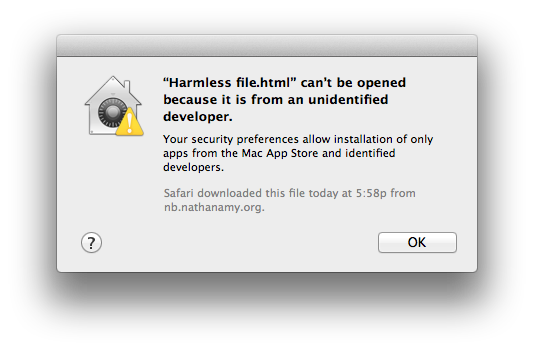
This week my Mac refused to open a plain text file, complaining that it was from an unidentified developer.
Mac OS X 10.8 introduces a new feature called Gatekeeper, which prevents applications from running unless they are either from the App Store or signed by a registered developer.
You can turn Gatekeeper off, but I have kept it on so far. I am willing to run unsigned Apps, but it is nice to be notified that they are unsigned before having to make that choice.
I never expected to be prohibited from opening a text file. Double-clicking the file got me nowhere. Dragging the file onto BBEdit in my dock did nothing. TextEdit, no. Safari, no. Eventually I right clicked the file and clicked “Open”, which is the prescribed way to get around Gatekeeper’s restriction. Of course this worked, but it opened the file in Byword, which is not my default text editor. I was perplexed.
For this to happen, I found that two things were necessary. One, of course, the file had to be downloaded from the internet. Your web browser sets the “com.apple.quarantine” extended attribute, which tells the computer to be extra careful with this file of dubious origin. Two, the file must be set to open in some application other than the default application. You can change which application is set to open a file by selecting “Get Info” in the Finder, and changing which application appears under “Open with”. This information is stored in the file’s resource fork.
This is clearly a bug. Maybe the operating system would want to prevent someone from tricking me into open a file in something other than my default application, but it should definitely allow me to open it by dragging it onto an application of my choice.
Here is a file that should make this happen on your computer: Harmless File.txt. In this case, I set the file to be opened with Safari, instead of whatever your default text editor is.
If you are curious, you can see the extended attributes by using the command
xattr -l "Harmless File.txt" on the command line.
There is one other situation that causes similar results. If you have an executable file with no extension, OS X identifies it as a “Unix Executable File” and by default uses Terminal to open it. Gatekeeper also prevents you from opening these files. This makes a little more sense, because opening them in the Terminal actually runs them, which is not what you should do with a random script downloaded from the internet.
What you should do instead is drag them onto a text editor and look at them. But Gatekeeper won’t let you do this either. Worse, if you try to get around Gatekeeper by right clicking and selecting “Open”, the file gets executed in a Terminal window. Oops.
These seem like edge cases, but they both hit me in the last week, so I created a service in Automator to clear the quarantine bit. (If you download the one I created, you will have to sidestep Gatekeeper, but for valid reasons.)
Here is the shell script from the Automator service:
for f in "$@"
do
xattr -d com.apple.quarantine "$f"
done